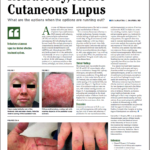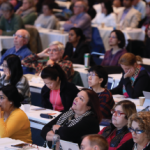Smooth Transitions
David Roofeh, MD, University of Michigan Rheumatology Fellowship, Ann Arbor, described the creation of a transition workbook, a collaborative training platform for transition care in pediatric rheumatic disorders. The need they were fulfilling: Many young patients with childhood-onset rheumatological diseases require medical care into adult life; they often experience transfer—rather than transition—of care, leading to lapses in medical care and leaving them ill prepared to navigate the adult medicine landscape.
Shivani Garg, MD, MS, University of Wisconsin, School of Medicine & Public Health, Madison, noted that lupus nephritis disproportionately affects women of color who are at high risk of premature kidney failure and loss of follow-up due to social barriers. “Multidisciplinary care can accelerate the pace of initiating treatment, improving patient education and addressing social barriers,” she said.
“Fellowship training often does not include longitudinal training in multidisciplinary clinics. Based on our fellows’ feedback and ITE scores, we identified an unmet need in teaching fellows the skills necessary to provide longitudinal and comprehensive care to patients with lupus nephritis,” she continued. “Thus, we designed a lupus nephritis curriculum for fellows to gain experience in co-managing care with a nephrologist and rheumatologist, and addressing social and medication barriers with a pharmacist and social worker.”
The results: One year after implementation, fellows reported a thorough understanding of the pathology of lupus nephritis, confidence in initiating therapy and advanced skills in providing comprehensive care for lupus nephritis. “Their ITE [in-training examination] lupus scores improved significantly,” Dr. Garg says.
She quoted one fellow as saying, “This is a unique opportunity to work in a multidisciplinary team to provide comprehensive care by considering all barriers patients may have to treatment and care.”
Life Imitating Art
Katarzyna Gilek-Siebert, MD, Roger Williams Medical Center and Brown University, Providence, R.I., discussed an intervention designed to prepare fellows to address disparities in disease and healthcare. She led a tour of a museum exhibit at the Rhode Island School of Design, Providence, titled, Variance—Making, Unmaking and Remaking Disability. The 30-minute tour was followed by a 30-minute discussion focused on reflections of the art depicting and/or created by people with disabilities.
“I went to see the Variance exhibit … after rounds at Rhode Island Hospital, where I am a consultant,” said Dr. Gilek-Siebert. “The fellow and I saw patients suffering in real life, in gowns and hospital beds, and then in the museum I imagined how the same patients might function after discharge in real life, where they are parents, employees, artists, not just patients. This stimulated me to give a similar opportunity to my fellows so they have a chance for similar reflection and, perhaps, even a life-changing experience.”



